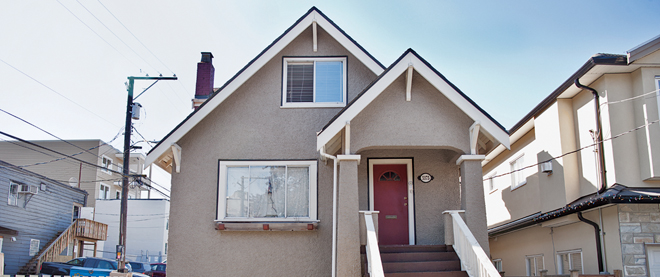Vancouver—the most livable city?
Good luck finding an affordable home in Vancouver. There are only a few. Six, actually.
Photographs by Simon Hayter
Share

Thinking of buying a home in Vancouver? If your budget is less than $600,000, well . . . forget about it. As of earlier this month, a search for detached residential properties on the Multiple Listing Service, the standard industry database that advertises real estate for sale through brokers, turned up a mere six houses priced below that threshold. These are not mansions, either. One is a 30-year-old, 1,260-sq.-foot dwelling. Another dates back to 1922. For many with a yearning for picket fences and a private drive, it means the entry point into Vancouver’s real estate market is out of reach.
According to Demographia, a survey of property affordability published by Illinois-based consultant Wendell Cox, the median price of a house in the city was 9.5 times the median income in the third quarter of last year. It doesn’t get any less affordable, the report indicates, except in Hong Kong and Sydney, Australia. Back in Vancouver, if you’re willing to settle for a bungalow, you’ll need an annual pre-tax income of $157,800, according to a study by the Royal Bank of Canada.
If thin walls, potentially obnoxious neighbours and lack of greenery don’t scare you, though, you might have better chances. According to Vancouver condo king Bob Rennie, one of the city’s best-known real estate brokers, the average selling price for an apartment last year was a more reasonable $313,000 (excluding high-end properties in the top one-fifth of the market).
In general, unless you have a deep emotional attachment to the idea of owning your own place, renting is the way to go, says David Sung, president of Nicola Wealth Management, a Vancouver-based wealth management and financial planning firm. In fact, renting may be the smart choice even if you are a homeowner. Two of Sung’s clients, a couple of professionals with one child, for example, recently made a tidy profit by selling their old house—whose value had ballooned since it was last on the market—and started renting a bigger home that they could hardly afford to buy at the current record prices.
Yet Vancouver is no renter haven lately. The city’s blogs and online communities are filled with rants against so-called “renovictions,” as landlords boot out long-time tenants to install hardwood floors and marble countertops in order to hike up rent or pay for things like security and safety upgrades. Appealing “no-fault” evictions can be a bureaucratic nightmare with uncertain and sometimes unpredictable outcomes, according to The Tyee, an independent online magazine in B.C.
Similar signs of collective frustration appeared on news sites last week following reports that Vancouver was no longer the world’s most livable city. A well-known survey of 140 cities across the globe compiled annually by The Economist removed Vancouver from the top ranking because of “increased congestion.” What about housing affordability, many incredulous Vancouverites wondered? As one particularly peeved reader of the Vancouver Sun wrote in the newspaper’s comments section, mentioning having to cheap out on groceries to pay rent: “Screw the scenery! I need to LIVE!”